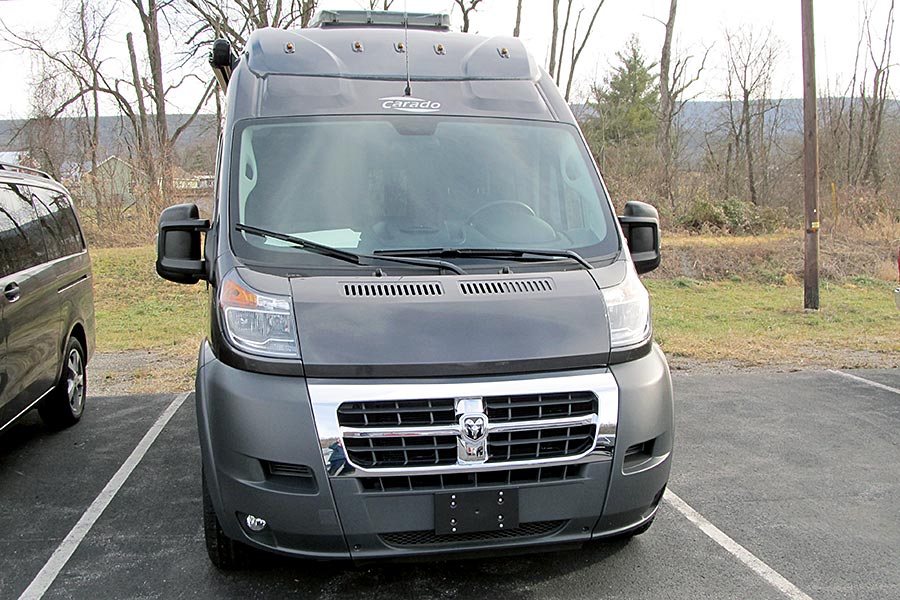
There’s no doubt that camper vans are expensive to purchase and maintain, especially if you bought one brand-new. However, there can be a significant turn-around if you buy and sell at the right time. There are some tips and tricks to help you get the most out of the transaction.
So, when are camper vans a good investment? It depends on your situation. If you are considering living in the camper van full time or you are an avid camper, then it might be a good investment for you. However, if you are only going to use your camper van a couple of weekends during the year, then it is probably not a good investment.
To get a camper van that’ll last you for over a decade, you should consider buying new. Other than that, used may be the way to go. You’ll save money on the initial depreciation that occurs on a new camper van when you drive it off the lot.
Throughout this post, you’ll learn the following bits of information:
- Figure out the best time to invest
- Should you buy new vs. used?
- Maintenance costs as part of the investment
- Are you too young to sink money into a camper van?
- Driving tips and advice
- Making a profit with your investment
- How to get the best resale value out of your camper van
Are Camper Vans A Good Investment?
There are two sides to owning camper vans and deciding whether or not they’re a good investment.
- You’re investing a tremendous amount of money into something that you’ll only use a few times per year. However, this only applies if you’re not living in it full-time, but it’s still something to consider. You’ll also have a significant price reduction if you don’t buy a new camper van.
- If you maintain a camper van, you can resell it for a decent amount of money. Renovations and modernization both go a very long way in turning heads and getting the attention of potential buyers.
Truthfully speaking, camper vans can be an excellent investment or a financial sinkhole. The pressure and worry that comes with buying a new vehicle seem double when you’re purchasing a camper van. Fortunately, this guide will help you get the best deals so you can throw your concerns out of the window.
Below are five factors that will help determine if you should invest in a used camper van.
How old is the camper van? It’s no secret that aged vehicles tend to have motor troubles, cosmetic problems, and more. When it comes to camper vans and other recreational vehicles, the interior design might be a bit out of touch if it’s over a decade or so old.
How many miles are on the odometer? The problem with mileage is that people often associate lower numbers as being better than higher numbers. However, if you’re looking at an old vehicle with low mileage, it could have rust, oil or coolant leaks, and a myriad of other troubles that need repairing.
How many previous owners were there, and how did they drive it? We’ve all seen reckless drivers taking corners way faster than they should or accelerating on the highway at dangerous speeds. Fewer owners is always a good sign since it shows that the vehicle is reliable and not a recycled mess.
Are there signs of leaks or water damage? One of the first things that you should look for in a camper van is water spots. If there are bubbles in the paint, discoloration along the walls, musty smells in the cabinets, or heat coming from drawers, you might have mold and or water damage. Also, look at the caulking around the outside.
Finally, how does it look under the hood? Checking out the engine, hoses, and other components is an excellent way to see how well it was maintained. If there are leaking fluids, stains from oil or other liquids, and rust, then you might want to think about moving on to a different camper van.
If you feel doubtful about any of these questions, you should always start searching elsewhere. Unlike passenger vehicles, there’s no need to rush a camper van purchase. Even if you plan on living out of it, you’ll be thanking yourself if you wait around for the right one. Try to set aside a budget for repairs, renovation updates, and other necessities if you’d like to.
Other Posts of Interest
Buying New vs. Used
When it comes to camper vans, buying new or used is one of the biggest debates of all. Used RVs are known to be a challenge because most of the really old vehicles may have rust and other problems that lead to countless difficulties. However, you’ll still be able to find hidden gems at some lots or when you’re purchasing from a private owner.
Below are listed some of the advantages and disadvantages of buying new and used camper vans:
Pros of buying new camper vans
Getting a brand-new camper van means that nobody else has driven in it or used any of the facilities. It’s nice to know that you’re the first person to use the shower, toilet, fridge, microwave, bed, and other amenities. There’s no need to be concerned about needing to clean it before you use it.
As we all know, new vehicles have fewer problems than used ones. You won’t have to replace the radiator, transmission, battery, and other mechanical parts for quite some time. You’ll also be able to relax with a new set of tires without any wear.
There are all sorts of options to customize a brand-new camper van, unlike anything in previous years. For example, you can request cabinetry materials, tile or carpet colors, sinks, microwaves, coffee machines, solar panels, and more. All of these customizations are unavailable if you’re buying a used vehicle.
New camper vans come with new sealing, loose or deteriorated caulking can cause bubbling, water leaks, and mold. The good news is that you can rest assured that your new camper van is free of any water-related issues.
New camper vans meet all of the requirements for RV parks. Some of them need your vehicle to be younger than 20 years, presentable (free of rust, ugly damage, etc.), and completely operational (water, electrical, etc.)
You can learn more about whether your camper van will be allowed at RV parks here.
Cons of buying new camper vans
The most apparent disadvantage is price. New camper vans can cost upwards of $120,000 or more. You won’t be able to find many new models under $60,000, which makes it a sinkhole for people who are worried about the expenses. The repairs aren’t cheap, either.
There’s a weird situation that happens with almost all new RVs that cause small maintenance issues within the first couple of years. Whether the sewage pipes have a small leak or the caulking peels off quickly, you might be in for a few surprises. Fortunately, the warranty will likely cover everything, so it’s more of an annoyance.
Although it’s not a financial woe, every little scratch and ding that occurs along the way will make you feel the pain. Tree branches, car doors, kids, pets, rocks, and plenty of other debris cause scuffs along the outside of your camper van. Each one of them will be very noticeable against the brand-new paint.
Pros of buying used camper vans
When you’re buying a used camper van, you won’t even have to spend 75% of the initial value, in most cases. Wait for a few years until all of the newer models are out and buy something that’s between 3 to 5 years old. You’ll get the best of both worlds without spending tons of money upfront.
As mentioned above, new camper vans often have a few problems that need repairing during the warranty period. If you buy a used camper van, all of those repairs will be taken care of before you even set foot inside of it. Not only that, but you’ll be cruising around with like-new parts.
If you don’t want to worry about customizing a camper van, then everything will be done for you by the previous owner. You’ll be able to take advantage of new countertops, solar power through all of the electrical outlets, swiveling captain’s chairs, and more without having to spend the additional money.
All new RVs and camper vans look and feel modern, which is great. However, if you want a nostalgic appearance with throwback appliances, then you’ll have to buy a used model. As long as you restore and maintain the interior, you’ll be able to cruise around in a used camper van without very many problems at all.
The resale value of a used camper van is much closer to the price you’ve paid. For example, buying a $120,000 camper van would sell for about $90,000, whereas a $15,000 used camper van would resell for $13,000 if you tried to sell it within a few years. The percentage and net loss are definitely in favor of used vehicles.
Cons of buying used camper vans
If there were several previous owners of the vehicle, you’d have to clean it before you use it. You never know how they used anything inside, so an in-depth cleaning process will take up a couple of days of your time before you start to use it.
There are far more components of a camper van than regular passenger vehicles. If you thought having to replace parts under the hood was bad, wait till you have to deal with sewage problems, malfunctioning kitchen appliances, and the water pump that controls all of the powered water features throughout the vehicle (showers, toilets, sinks, etc.).
Old camper vans tend to look somewhat outdated. Some people find it appealing; others look at it as a hindrance. This older style may or may not be a disadvantage for you and your travel crew, but it’s worth mentioning.

Is It Smart To Buy A Camper Van When You’re Young?
If you take a brief look into the camper van community, you’ll find countless questions about whether or not it’s a good idea to buy a camper van when you’re 40 or younger. The main reason behind this inquiry is the fact that younger people probably won’t be able to use a camper van too often because they’re not retired.
Another concern is that young people often want to save money for a home, cars, and other investments that people over 40 probably already have. After scouring through all of the responses, you’ll notice that the answers are all over the place. Some people say that you should wait until you have more time on your hands, and others say buy one ASAP.
Here’s the short answer; it all depends on your financial priorities and how often you’ll use the camper van. If you’re ready to own a camper van, then you can make it happen. Create a safety net for maintenance and unexpected expenses. Also, you should consider buying a used vehicle for your first time since it might not be as enjoyable as you thought.
The problem with buying a super expensive camper van (other than sinking tons of money into it upfront) is that it affects your debt to income ratio. When you’re applying for houses, vehicles, and other significant investments, companies tend to look at the ratio to see if you’ll have more than enough money to cover the costs.
If you’re planning on taking on a mortgage loan or you want a new car, you should try to pay the camper van off in full. This decision will prevent the purchase from reducing your debt to income ratio, giving you a much higher chance of being approved for loans later on down the road. It also saves you from paying too much interest.
What Are The Maintenance Costs?
Part of the investment of a camper van is the maintenance and repair costs. You shouldn’t buy a vehicle if you don’t have a couple of thousand dollars sitting in your bank for a bad day on the road. Motorhomes and camper vans are known to have tire issues occasionally, as well as various problems with the interior utilities as they get older.
The costs that you should expect for under the hood repairs include fluid changes, engine maintenance, and so on. The good news is that most camper vans have the chassis of other standard vehicles. For example, a Ford E-150 cargo van converted into a DIY camper van, share some of the same components as the Ford F-150 trucks.
Getting parts is easy when you’re able to find them at most auto parts stores, which is one reason why you should consider buying from a well know company. Other than regular vehicle maintenance, camper vans also come with several other problems, including kitchen, bedroom, and bathroom repairs.
For example, refrigerators can cost between $500 to $2,000, depending on the brand, quality, and other factors. If you’re making a DIY conversion camper van, you’ll be able to save some money by shopping around and watching for one on sale. Either way, the repair costs are something that you should keep in mind.
Air conditioners and roof vent fans are another costly expense that you’ll undoubtedly have to face if you decide to keep your camper for several years. They can range between $200 to $600 per unit. Keep in mind that some camper vans and RVs have multiple fans, which can add up pretty quickly if they all go out at once.
Something that people often forget about when it comes to camper vans is the electrical system. Whether you’re using house batteries that power the entire vehicle or solar power to charge deep cycle batteries throughout the day, you’re going to need an inverter. Inverters cost between $200 to $2,000 or more, again depending on the make, model, and other variables.
Other noteworthy maintenance and repairs include:
- Sewage pipes and tanks (they range between $20 to $200+ for repairs).
- Sinks, countertops, and cabinetry (the prices depend on the materials and colors you choose and whether or not you’re paying a professional).
- Water pump replacements ($75 to $250+) and repairs ($5 to $50).
- Fixing damaged bed frames, replacing bedding, and other bed-related repairs (again, the price depends on your personal preferences).
Low-Top, High-Top, And Folding Top Camper Van Comparisons
Before you choose a camper van to purchase, you should consider the differences between low-top, high-top, and folding top camper vans. Mid-top is also an option, but they’re not very common. However, mid-top camper vans are excellent if you want something that you can have more headroom without being limited when parking.
Every type of camper van has a different resale value that corresponds with its functions. For example, low-tops sell better for business reasons, while high-tops sell much quicker to people who are using them for recreational purposes. When you’re buying a camper van, you should always think about how you’ll be able to turn the investment around when you are ready to sell.
Let’s look through the differences between each of the three camper van sizes to figure out which one you should purchase.
Low-top camper vans
Low-tops are an excellent choice for solo campers, but you shouldn’t use them if you have more than two people. The compact size is far too small to fit multiple people since nobody will be able to stand. However, you’ll be able to take the vehicle through drive-thrus and low over-hangs without having to worry about hitting anything.
Also, low-top camper vans almost always have better gas mileage because they weigh less. When you’re pulling less weight, the vehicle saves you money. It’s also a bit more aerodynamic, but whether or not it saves you money is up for debate. Ultimately, low-top camper vans are ideal for people who are on a budget, and those who don’t mind the cramped space.
High-top camper vans
The next option is the high-top camper vans. These vehicles have the added luxury of being able to stand and walk around. They are high enough that you do not need to worry about bumping your head. They also have plenty of extra space to install cabinets, bookshelves, spice racks, and other amenities.
High-top camper vans tend to be some of the most expensive options on the market. Most DIYers want this type of van, so their high demand raises prices well beyond that of a low-top camper van. It’s not uncommon to see a high-top cost $20,000 more than a low-top camper van. However, you might feel that the investment is well worth it for convenience and luxury.
Folding top camper vans
Lastly, folding top camper vans offer the best of both worlds. You’ll be able to cruise under low-hanging obstacles like a low-top camper van, but when it’s time to set up camp, raise the top, and you’ll be able to walk around and stretch a bit. Most folding tops also have vented windows to let the breeze in, which is also a considerable advantage.
Unfortunately, the seams sometimes leak. If you experience this problem, you’ll have to purchase and install new weather stripping. Also, installing solar panels and roof vent fans can be a frustrating process because you’ll have to find open space that doesn’t fold up or down to prevent the cord from being pulled.
How to Make An Income Or Profit With A Camper Van
Camper vans are a good investment if you intend to use them enough to make the price worth it, but you can also make a decent profit by following a few simple suggestions. You might even have a positive cash flow by being able to make more money than you spend on the monthly payment.
Here are a few suggestions to make money with your camper van:
Rent it out to people who want to travel the area. Whether you’re asking friends, family, or random people who live in your town, everyone loves to rent a camper van for the weekend. You can make up to $50 to $100 per day, which should eclipse any monthly payments if you rent it out every weekend.
Before you sell the camper van, renovate a few of the amenities. You don’t have to replace everything, but a new solar system and updated kitchenware always look great in an ad. You could also put on a brand-new set of tires. You’ll spend a few thousand dollars, but it could drastically increase the resale value.
Living in a camper van has limitations, but you’ll be able to save quite a bit of money if you’re able to keep an income. Most camper vans cost between $100 to $500 per month, depending on how new and well kept they are. Even at the maximum price, you won’t find a mortgage or house rental that comes close to such an affordable deal.
Getting The Best Resale Value From A Camper Van
A financial investment is only a smart decision if you can make some, all, or more of your money back than you initially spent. Granted that camper vans provide countless memories and endless bouts of fun, you probably still have a desire to get some extra cash when it’s time to get rid of it to another buyer.
Motorhomes and camper vans are tough to sell, especially if you made a DIY conversion van. However, if you’re patient, you can get a great sale in due time. Here are a handful of tips to make a profit when reselling your camper van:
Maintain your records. Keep paper trails for all of your repairs, maintenance procedures, and renovations that you’ve done to the vehicle. When it’s time to sell it, you’ll be able to present all of the new parts to make it an appealing camper van for anyone who’s on the market.
Don’t forget to keep up on fluid changes. People always worry about the expensive parts, such as the transmission, suspension, and engine. The fluids are cheap, but they sneak up and cause severe problems very quickly. For example, old transmission fluid can make the gears slip, ruining your transmission.
Be honest about all of the problems throughout the camper van. If you don’t mention that ripped awning or that the bed frame has a crack, someone will spot it and feel as if you are dishonest. They might even wonder if you’ve hidden additional issues as well. Always be truthful when you’re selling, you’ll get a buyer much quicker.
If you’re able to, try to sell the vehicle before it hits 100,000 miles. People are much more likely to buy a camper van (or any other vehicle) for more money when there are five digits on the odometer rather than six. Again, this might not be a possibility if you purchased the camper van when it already had more mileage.
Lastly, be sure to clean the interior and exterior of the vehicle, and don’t forget to top off the gas tank before the potential buyer arrives. These little differences make a massive impression by showing that you pay attention to the details. When your buyer notices these suggestions in action, they’ll feel as if they’re purchasing from a person who takes good care of their vehicles.
If you’re ready to sell your camper van, read our post “How Do You Get the Best Price When Selling Your Van Camper?”
Conclusion
All in all, camper vans are a good investment if you have the extra money. You shouldn’t buy one if you’re not ready to deal with the maintenance costs, but the excitement and adventures are well worth it if you can afford the experience. It’s important to keep in mind that camper vans aren’t going to have decent resale value if you buy them brand-new.
Weigh your pros and cons, figure out what size, make, model, and year you should purchase, and have a blast knowing that you made an investment that’ll provide endless riveting memories.





